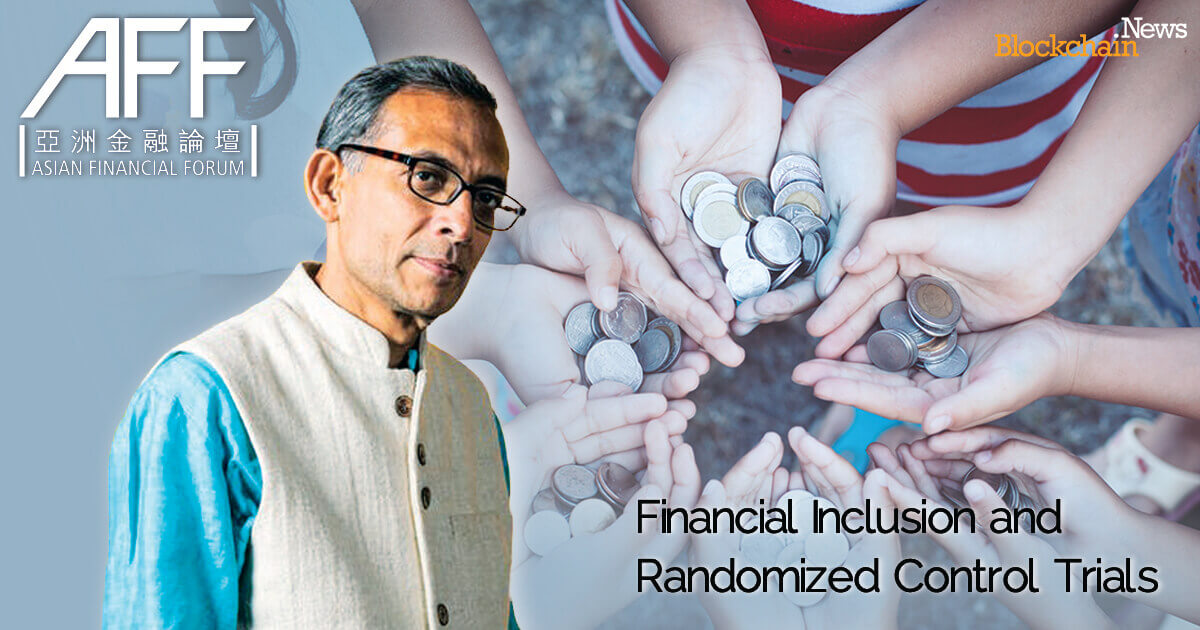Nobel Laureate Prof Banerjee - Applying RCT to Financial Inclusion
Lucas Cacioli Jan 09, 2020 06:30
Economists have long theorized on and sought to implement initiatives to increase financial inclusion. What are some of the policy initiatives developing countries should adopt to drive financial reform? What effect have initiatives had thus far in facilitating this financial transformation? Prof Banerjee will speak at the Asian Financial Forum on January 14th and explain his team's groundbreaking application of randomized control testing to inclusive finance.


On the second day of the Asian Financial Forum (AFF), Prof Abhijit Vinayak Banerjee, the winner of the Nobel Prize in Economic Sciences will deliver a keynote speech on financial inclusion. Banerjee won the esteemed prize along with fellow MIT economist and spouse Esther Duflo and Harvard Academic, Michael Kremer.
What is Financial Inclusion?
Financial inclusion refers to making financial products and services accessible and practical for everyone regardless of the individual or businesses net worth or company size. According to the United Nations, financial inclusion is positioned prominently as an enabler of other development goals for its 2030 Sustainable Development Goals.
Financial inclusion is a common theme for developing countries which house more than 90% of the world’s unbanked population. There is strong evidence that financial inclusion benefits poor populations by providing them access to credit and investment services and low-cost payment mechanisms and hence achieve financial self-reliance. According to data from the World Bank, some 1.7 billion people were unable to access a basic bank account in 2017. Often called inclusive finance—financial inclusion is an effort to remove barriers that exclude people from participating in financial services which could vastly improve their lives.
Why listen to Prof Banerjee?
Economists have long theorized on and sought to implement initiatives to increase financial inclusion. What are some of the policy initiatives developing countries should adopt to drive financial reform? What effect have initiatives had thus far in facilitating this financial transformation?
At the AFF, Prof Banerjee will share his perspectives on these economic policy initiatives and discuss financial inclusion progress in developing countries, particularly in India.
Banerjee, Duflo and Kremer have been praised for their practical approach to their research. When the three economists were awarded the Nobel Prize for their pioneering research into the use of experimental approaches to fight global poverty, the Prize committee commended the trio for introducing, “a new approach to obtaining reliable answers.” The work of Banerjee and his Nobel Laureate team is considered to be instrumental in the utilization of randomized controlled trials to test the effectiveness of government policy interventions designed to alleviate poverty.
Breaking The Problem Down
Randomized control trials (RCT) are experiments that are designed to isolate the influencing factors that a certain intervention or variable has on a result or event.
For a long period of time, RCT as a research tool was largely used only in fields such as biomedical sciences to gauge the effectiveness of various drugs. In the 90s, Banerjee, Duflo, and Kremer began to apply the technique to the field of economics. Kremer first applied RCT to study the impact that free meals and books were having on the education outcomes of Kenyan schools. Banerjee and Duflo conducted similar experiments in India and wrote extensively about the use of RCT for practical outcomes in their book Poor Economics which was published in 2011.
According to the Royal Swedish Academy of Sciences, the work of the economist trio that won them the Nobel prize has shown how poverty can be addressed by breaking it down into smaller and more precise questions in areas such as education and healthcare–making them more practically solvable. The press release said, “The research conducted by this year’s Laureates has considerably improved our ability to fight global poverty. In just two decades, their new experiment-based approach has transformed development economics which is now a flourishing field of research.”
.jpg)